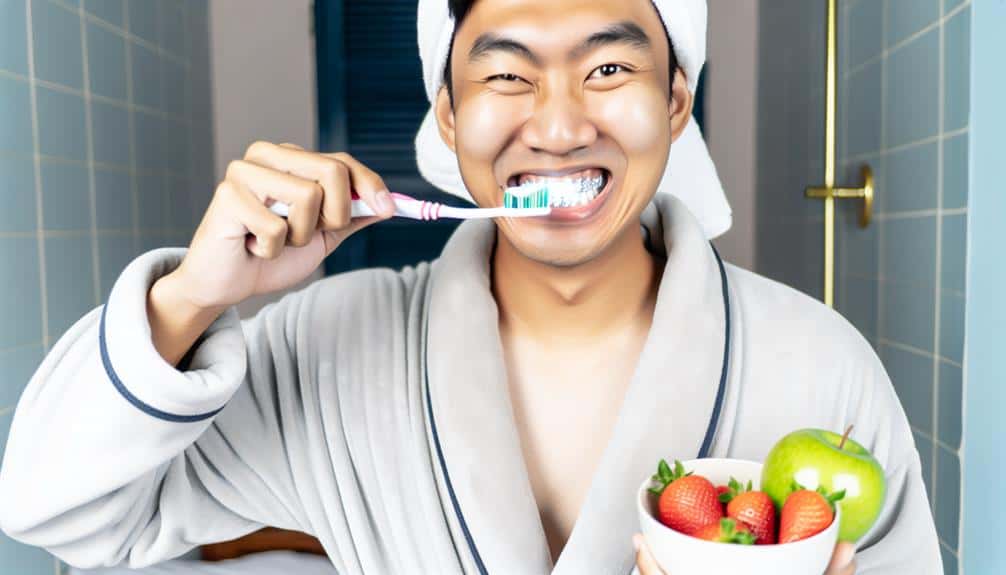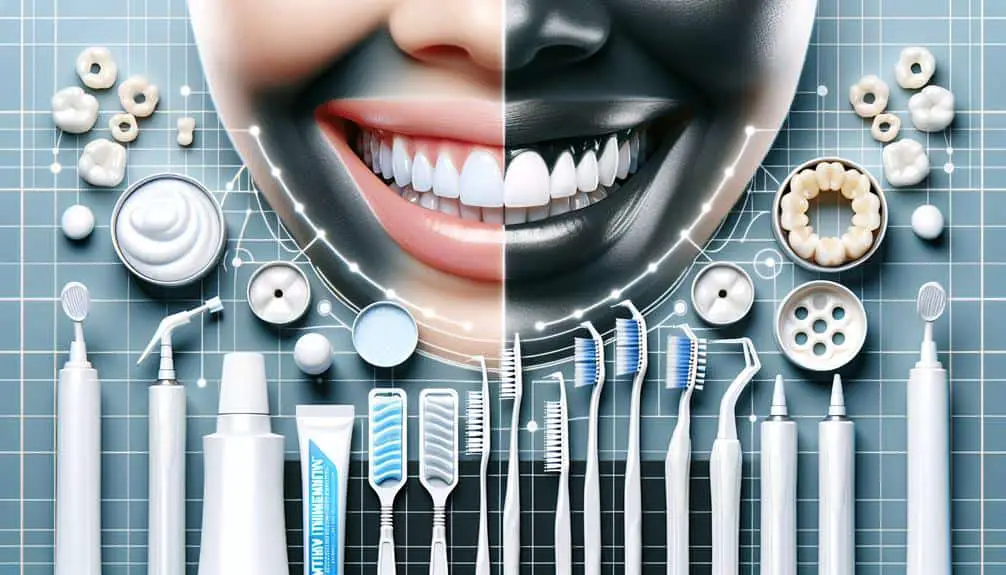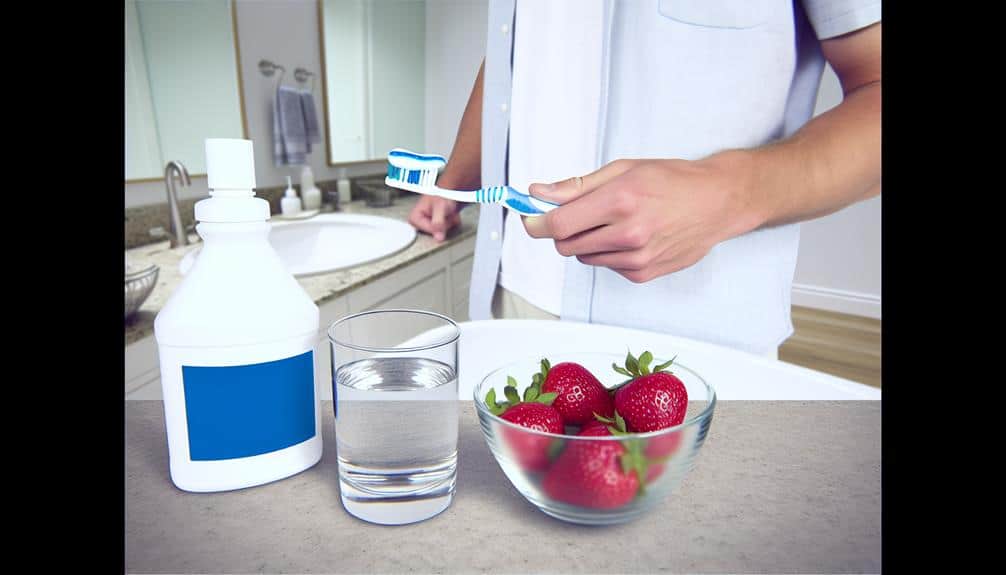To achieve a brighter smile, consider natural remedies such as baking soda and activated charcoal, along with using whitening toothpaste, strips, and trays at home. Avoid stain-causing beverages like coffee and red wine, and maintain oral hygiene by brushing with fluoride toothpaste and daily flossing. If you're enthusiastic to enhance your whitening efforts, professional treatments offer quicker and more noticeable results, while DIY kits provide a budget-friendly and convenient option for maintaining your desired brightness.
Key Points
- Avoid stain-causing beverages like coffee, tea, and red wine.
- Practice good oral hygiene to prevent plaque and tartar buildup.
- Use natural remedies like baking soda and hydrogen peroxide.
- Consider home treatments such as whitening toothpaste and strips.
- Follow recommended professional treatments for quick and noticeable results.
Causes of Tooth Discoloration
If you're wondering why your teeth aren't as white as you'd like them to be, understanding the causes of tooth discoloration is key to finding effective solutions. One common reason for tooth discoloration is the consumption of dark-colored beverages like coffee, tea, and red wine, which can stain the enamel over time. Smoking is another major culprit, as the tar and nicotine in cigarettes can lead to yellowing of the teeth. Additionally, poor oral hygiene allows plaque and tartar to build up on the teeth, resulting in a dull and discolored appearance.
To prevent stains and maintain a bright smile, consider incorporating natural remedies into your dental care routine. For example, brushing your teeth with baking soda occasionally can help remove surface stains. Oil pulling with coconut or sesame oil is another natural method that may reduce bacteria in the mouth and promote whiter teeth. Finally, consuming crunchy fruits and vegetables like apples and carrots can help scrub away plaque and prevent staining.
Effective Whitening Techniques
To enhance the whiteness of your teeth, consider incorporating effective whitening techniques that can help eliminate stains and brighten your smile. When looking to whiten your teeth, natural remedies and home treatments can be beneficial options to explore.
Natural remedies such as baking soda, hydrogen peroxide, and activated charcoal have been suggested to help whiten teeth by removing surface stains. These items can be used with care and caution to guarantee safe whitening.
Home treatments like whitening toothpaste, whitening strips, and whitening trays are also popular choices for achieving a brighter smile in the comfort of your own home. Whitening toothpaste typically contains mild abrasives or polishing agents to remove surface stains. Whitening strips and trays, on the other hand, often use peroxide-based whitening agents to penetrate deeper into the enamel and target tougher stains. Following the instructions provided with these products is crucial to ensure safe and effective results.
Foods to Avoid for Whiter Teeth
Avoiding certain foods can play a crucial role in maintaining the whiteness of your teeth. Stain causing beverages like coffee, tea, and red wine can contribute to tooth discoloration over time. These beverages contain chromogens, tannins, and acids that can adhere to the enamel of your teeth, leading to stains. To prevent this, consider reducing your consumption of these beverages or using a straw to minimize contact with your teeth.
Moreover, certain tooth staining habits like smoking or chewing tobacco can greatly impact the color of your teeth. Nicotine and tar found in tobacco products can cause yellow or brown stains that are challenging to remove with regular brushing alone. Quitting these habits can't only benefit your overall health but also help in maintaining whiter teeth.
Being mindful of what you consume and avoiding stain-causing beverages and tooth staining habits can aid in preserving the brightness of your smile. Remember, prevention is key when it comes to maintaining the whiteness of your teeth.
Professional Whitening Vs. DIY Kits
When considering options for teeth whitening, comparing professional whitening treatments with DIY kits can help you make an informed decision based on your needs and preferences.
Professional Whitening:
- Pros:
- Effectiveness: Professional treatments often provide quicker and more noticeable results.
- Customization: Dentists can tailor the treatment to address specific concerns like sensitivity or deep stains.
- Supervision: Trained professionals oversee the process, ensuring safety and proper application.
- Cons:
- Cost: Professional whitening treatments can be more expensive than DIY kits.
- Time: Appointments may take longer and require multiple visits.
- Sensitivity: Some individuals may experience increased tooth sensitivity after professional treatments.
DIY Kits:
- Pros:
- Affordability: DIY kits are generally more budget-friendly.
- Convenience: You can whiten your teeth at home on your own schedule.
- Ease of Use: DIY kits are designed for easy application without special training.
- Cons:
- Effectiveness: Results may vary, and it can take longer to see noticeable changes.
- Risk of Misuse: Incorrect application can lead to uneven whitening or tooth sensitivity.
- Limited Customization: DIY kits may not address specific dental concerns like professional treatments can.
Maintaining Whitened Teeth
For optimal results, regularly integrate dental hygiene practices recommended by professionals to maintain the brightness of your teeth after whitening treatments. Consistent oral hygiene is vital in preserving your newly whitened smile. Brush your teeth at least twice a day with a fluoride toothpaste to remove plaque and prevent stains from setting in. Floss daily to clean between your teeth and along the gumline, where stains can accumulate. Additionally, consider using a whitening toothpaste a few times a week to help sustain your teeth's brightness.
Beyond oral hygiene, lifestyle habits play a significant role in keeping your teeth white. Avoid foods and drinks that are known to stain teeth, such as coffee, tea, red wine, and dark berries. If you do consume these items, rinse your mouth with water afterward. Quit smoking, as tobacco can cause yellowing of the teeth. Regular dental check-ups and cleanings are also essential to remove surface stains and maintain the overall health of your teeth. By combining proper oral hygiene practices with mindful lifestyle choices, you can prolong the effects of your whitening treatments and enjoy a radiant smile for longer.
Frequently Asked Questions
Are There Any Natural Remedies That Can Help Whiten Teeth?
For natural remedies to whiten teeth, consider herbal options. Their effectiveness can vary, so research thoroughly. DIY treatments can be safe, but always prioritize dental health. Remember, a healthy smile is a confident smile.
Can Certain Medications or Medical Conditions Affect Tooth Discoloration?
Certain medications and medical conditions like antibiotics, antihistamines, and conditions like enamel hypoplasia can affect tooth discoloration. It's important to consult your dentist about drug interactions and how medical conditions may impact your dental health.
How Long Does It Typically Take to See Results From At-Home Whitening Kits?
When using at-home whitening kits, you may notice results in as little as a week. The whitening gel effectiveness varies, but be cautious of tooth sensitivity concerns. Consistency is key for a brighter smile.
Are There Any Specific Toothpastes or Mouthwashes That Can Help Maintain Whiter Teeth?
To maintain whiter teeth, consider your diet impact, use specific toothpaste and mouthwash, and professional treatments. Look for products with whitening agents like hydrogen peroxide. Consult with your dentist for tailored advice on improving and preserving your smile.
Is It Possible to Over-Whiten Teeth and Damage Them in the Process?
When you whiten teeth excessively, it's like scrubbing a delicate pearl too hard. Your tooth enamel can suffer, leading to risks like increased tooth sensitivity, gum irritation, and even weakening of the enamel. Protect your smile wisely.



